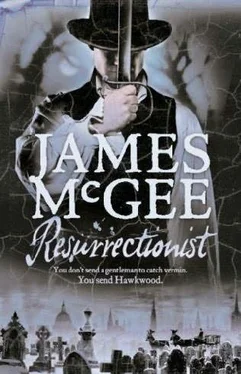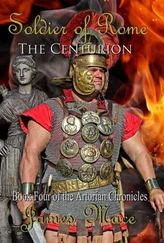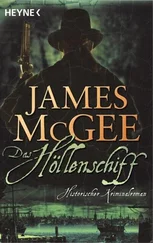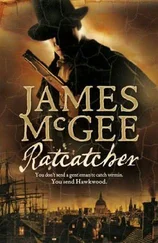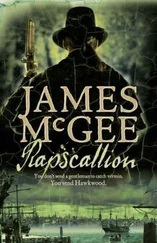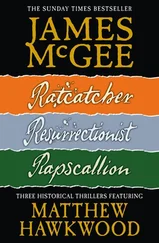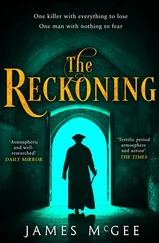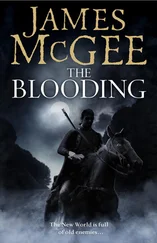James McGee - Resurrectionist
Здесь есть возможность читать онлайн «James McGee - Resurrectionist» — ознакомительный отрывок электронной книги совершенно бесплатно, а после прочтения отрывка купить полную версию. В некоторых случаях можно слушать аудио, скачать через торрент в формате fb2 и присутствует краткое содержание. Жанр: Исторический детектив, на английском языке. Описание произведения, (предисловие) а так же отзывы посетителей доступны на портале библиотеки ЛибКат.
- Название:Resurrectionist
- Автор:
- Жанр:
- Год:неизвестен
- ISBN:нет данных
- Рейтинг книги:4 / 5. Голосов: 1
-
Избранное:Добавить в избранное
- Отзывы:
-
Ваша оценка:
- 80
- 1
- 2
- 3
- 4
- 5
Resurrectionist: краткое содержание, описание и аннотация
Предлагаем к чтению аннотацию, описание, краткое содержание или предисловие (зависит от того, что написал сам автор книги «Resurrectionist»). Если вы не нашли необходимую информацию о книге — напишите в комментариях, мы постараемся отыскать её.
Resurrectionist — читать онлайн ознакомительный отрывок
Ниже представлен текст книги, разбитый по страницам. Система сохранения места последней прочитанной страницы, позволяет с удобством читать онлайн бесплатно книгу «Resurrectionist», без необходимости каждый раз заново искать на чём Вы остановились. Поставьте закладку, и сможете в любой момент перейти на страницу, на которой закончили чтение.
Интервал:
Закладка:
Locke blinked.
“Look around, Doctor. Not a chair overturned, not so much as a bishop upended or a pawn knocked out of its square. Doesn’t that strike you as odd? You think the man just stretched out and allowed himself to be butchered? He was already dead before that was done to him. He had to be.”
Locke looked pensive. “I found no obvious signs of injury to the body — other than the trauma… damage… to the face, of course — which suggests the cause of death could have been suffocation. A sharp, swift blow to the stomach, perhaps, to incapacitate, followed by a pillow over the face. Death would occur in a matter of minutes; less, probably, if the victim was already gasping for air.”
“So he smothered him, then mutilated him? Well, that’s certainly a possibility, Doctor. So tell me: where did he get the blade?”
The question seemed to hang in the air. Locke went pale.
“I’m assuming there are rules about patients owning sharp objects, knives and such?” Hawkwood said.
Locke shifted uncomfortably. “That is correct.”
“Not even for cutting up food?”
“That is done by the keepers.”
“And razors? What about shaving?”
“The difficult patients are secured. Those of a more… placid… disposition are looked after, again by the keepers, usually with a pot-boy in attendance.”
Hawkwood saw that the apothecary was clenching and unclenching his hands.
“What is it, Doctor?”
Locke, clearly agitated, swallowed nervously. “It’s possible that I may have… ah, inadvertently, provided Colonel Hyde with the opportunity to procure the… ah, murder weapon.”
“Oh, and how is that?”
Cowed by the look in Hawkwood’s eyes, the apothecary started to knead the palm of his left hand with his right thumb. It looked as if he was trying to rub a bloodstain out of his skin. “There were occasions when I was called upon to attend the colonel in my… ah, medical capacity.”
“Really?”
“Nothing too serious, you understand: a purgative now and again, and there was the lancing of an abscess a month or so ago.” The apothecary’s voice faltered as he realized the significance of the confession.
“So you’d have had your bag with you?”
“Yes.”
“Which would have contained what, exactly?”
“The usual items: salves, pills, emetics and suchlike.”
“And your instruments?”
There was a moment’s pause before the apothecary answered. When he did so, his voice was close to a whisper. “Yes.”
“Your surgical knives, with their sharp blades? Because you’d need a knife with a sharp blade to lance an abscess, wouldn’t you, Doctor?” Hawkwood said.
The apothecary glanced towards Leech, but there was no sympathy on the attendant’s face, merely relief that someone else was in the firing line.
Hawkwood pressed home his attack. “That’s what happened, isn’t it? At some time during one of your visits to remove a boil from the colonel’s arse, he managed to steal one of your damned scalpels.”
Locke’s face crumpled.
“And you’re telling me you didn’t even notice the loss?”
Locke’s expression was one of abject misery.
Hawkwood shook his head in disbelief. “I’ve half a mind to arrest you, Doctor, though, frankly, I wouldn’t know what to charge you with — complicity or incompetence. I’m beginning to wonder what sort of place you’re running here. Good Christ, who’s in charge of your damned hospital, the staff or the lunatics?”
Locke’s cheeks coloured. His eyes, magnified by the round spectacle lenses, looked as big as saucers.
Hawkwood was aware that Attendant Leech was staring at him. Word of the apothecary’s dressing down would be all over the hospital the moment Leech left the room. He nodded towards the body and the ruin that had once been a man’s face. “How long would it have taken to do that?”
Locke took a deep breath; his lips formed a tight line. “Not long, if the murderer knew his trade.”
There was a pause.
“Well, go on, tell me,” Hawkwood said, wondering what else was to come.
“Colonel Hyde was an army surgeon. He operated in field hospitals in the Peninsula. His treatment of the wounded was, I understand…” Locke bit his lip “… highly regarded.”
“Was it indeed?” Hawkwood digested the information. Then, taking a candle from the table, he stepped through the archway into the other half of the cell.
There was another table upon which stood a jug and a washbowl. Against one wall sat a mahogany desk, a folding chair and a large wooden chest bound with brass. Looking at them, Hawkwood felt an instant stab of recognition. As a soldier he’d seen desks and chests like these more times than he cared to remember. Enter any officer’s quarters, be it in a barracks, or even a battlefield bivouac, and it would be furnished with identical items; they were standard campaign equipment. He even had a chest of his own, strikingly similar to the one here, back at his lodgings in the Blackbird tavern. It had been acquired during his time in the Peninsula, at an auction following the death of the chest’s former owner on the retreat to Corunna.
The room and its contents were at complete odds with the bare functionality of the sleeping quarters and a world apart from the conditions in which the other patients, or at least the ones he’d seen, were being kept. Those had bordered on the inhumane. By contrast this accommodation was verging on the palatial. Why should that be? Hawkwood wondered.
By far the greatest contrast lay in the collection of books and the drawings that covered the walls; several score, by Hawkwood’s rough estimate. So many, they would not have disgraced a small library. Hawkwood held the candle close and ran his eye over the serried ranks of leather-bound volumes. None of the authors’ names meant anything: Harvey, Cheselden, Hunter. Others were evidently foreign. Vesalius and Casserio appeared to be Italian, while some, like Ibn Sina and Massa, sounded vaguely Oriental. The ones in English were all similar in tone: Anatomy of the Human Body, The Motion of the Heart, The Natural History of the Human Teeth. There were others with titles in Latin. Hawkwood assumed they were medical texts, too.
The etchings and engravings that filled the spaces on the cell walls were in a similar vein, literally. Each and every one of them showed representations of the human body in anatomical detail, skeletal and musculature, both whole and partial, from skulls and torsos to arms and legs. A couple, which to Hawkwood’s untutored eye resembled the root system of a tree, were, he realized upon closer examination, diagrams of veins and arteries. Some were close to life size, others were smaller and looked as if they might have been torn from the pages of books or old manuscripts. Many of the renditions depicted the moving parts of the body, such as the neck and the joints at wrist, elbow and knee; all were remarkably and gruesomely intricate. The illustrations had an unsettling quality. Looking at them, Hawkwood realized why he was experiencing disquiet. The drawings reminded him of the horrific wounds and the amputated limbs he’d seen in the army’s hospital tents. The smell in the cell brought it all back to him. The only things missing were the blood and the screams; the screams, at any rate.
He sensed a presence at his shoulder.
“The miracle of the human body,” Locke said softly. “Men have strived for centuries to learn its mysteries.”
An illustration caught Hawkwood’s attention. It was nightmarishly graphic, depicting the lower half of a human torso from stomach to mid-thigh. The skin of the lower belly and pelvic area had been opened and peeled back layer by layer to reveal the interior of the abdomen. The upper legs were shown severed at mid thigh. The end of each thighbone could be seen encircled by densely packed layers of muscle and flesh. Each limb looked disturbingly similar to the cuts of meat he’d seen hanging from hooks above the Smithfield butchers’ stalls he’d passed on his way to the hospital. He found himself transfixed. The figure did not appear to possess genitalia, which seemed odd, given the artist’s exceptional eye for detail. He looked closer, raising the light, and realized what he was looking at and what it meant. The figure was female.
Читать дальшеИнтервал:
Закладка:
Похожие книги на «Resurrectionist»
Представляем Вашему вниманию похожие книги на «Resurrectionist» списком для выбора. Мы отобрали схожую по названию и смыслу литературу в надежде предоставить читателям больше вариантов отыскать новые, интересные, ещё непрочитанные произведения.
Обсуждение, отзывы о книге «Resurrectionist» и просто собственные мнения читателей. Оставьте ваши комментарии, напишите, что Вы думаете о произведении, его смысле или главных героях. Укажите что конкретно понравилось, а что нет, и почему Вы так считаете.
